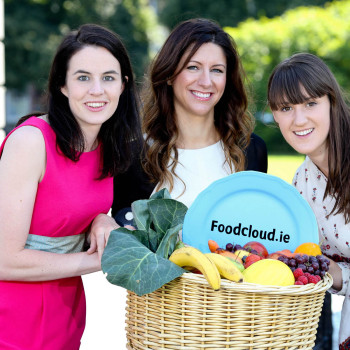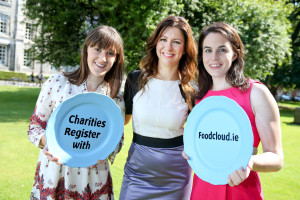Heads in the cloud

Two Trinity College Dublin graduates, Aoibheann O’Brien and Iseult Ward have fused an unlikely partnership with Tesco Ireland by coming up with a solution to help the retailer implement a new sustainable solution for food waste. Fionnuala Carolan hears their story
11 November 2014
Food waste is a massive problem in our society. So is poverty. Many families can barely afford to feed their families while simultaneously supermarkets are pouring thousands of tonnes of food into landfill every day. It seems crazy because it is crazy. These two problems continue to coexist because taking surplus food and redistributing it to those that need it most is logistically challenging. Two young Irish women have come up with a feasible and sustainable solution to this issue in the form of an app called FoodCloud.
How it works
The way this app works is that it allows retailers to indicate when they have surplus food stocks, and for charities in the area to connect and arrange for distribution of the food.
 O’Brien explains how the idea came about: “I had been working in London in an investment bank and there was lots happening around surplus food over there. There was a food bank, pop-up cafés using surplus food, there were product ranges using surplus fruit and vegetables and so when I came back to Ireland to do my masters in environmental science in Trinity, I was thinking I’d have loads of time to volunteer with organisations like this in Dublin and then realised that there was none and nothing really happening in this area.”
O’Brien explains how the idea came about: “I had been working in London in an investment bank and there was lots happening around surplus food over there. There was a food bank, pop-up cafés using surplus food, there were product ranges using surplus fruit and vegetables and so when I came back to Ireland to do my masters in environmental science in Trinity, I was thinking I’d have loads of time to volunteer with organisations like this in Dublin and then realised that there was none and nothing really happening in this area.”
O’Brien met her business partner Iseult Ward at a social enterprise event in Trinity. “Iseult and I bonded over our love of food and hatred of waste and I was telling her what was happening in London and we said we have to do something, or at least try,” explains O’Brien.
The duo began by calling the organisers of farmers markets in Dublin and the first one was Honest to Goodness Farmers Market in Glasnevin. They asked them would they consider donating leftover produce to a charity around the corner. This was their first successful donation but they soon realised that this was too time and work intensive to be able to grow it into a sustainable business.
Tesco on Camden Street has made 86 donations since the initiative started and has given away the equivalent of 3,000 meals.
O’Brien continued to research the problem by picking the topic of food waste for her thesis. She soon learned about international practice in this field and wanted to see if it would be possible in Ireland. She says: “My thesis gave me the opportunity to really research it and we identified the app model which was working in Chicago. So we said, that’s it, that’s what’s going to make it scalable and we identified the retail sector as the area where the most valuable food for the charities was. Everyone thinks cafés and bakeries are the ones to target but the reality is that charities shop in supermarkets so it’s the food they are used to working with. If you give them a second-hand curry from a café, they don’t know if they can reheat it, freeze it etc. The other thing about the app is it’s very community-focused and it’s instant.”
Hard graft
It took almost two years of work to do the research on the app and get all the safety and legal contracts in place. O’Brien had returned to London and Ward was still at college and she describes it as “a very student kind of project but with big ambitions”.
It was difficult to keep things going in this capacity but their big break finally came in 2013 when Tesco took a leap of faith in them. Tesco initially ran a pilot programme with Foodcloud from October 2013 to February 2014. The scheme saw almost 27 tonnes of food being saved from landfill, which translates as almost 60,000 meals spread across 38 charities.
“We started working with Tesco in the Talbot Street store linking with inner city charities there and it worked really well,” O’Brien explains. “We had extended it to 11 stores by December and then we launched in the Tesco Extra in Drogheda in Louth and that was really testing the model to see if it would work without us supporting it.”
The trial in Drogheda went really well and resulted in Tesco deciding to roll it out countrywide. O’Brien explains: “In July we agreed that they would be our first national partner. Since then it’s been a whirlwind for us. Everybody is looking for a solution to waste in the retail sector. It’s actually new to everybody.”
Great results
She says that the results have been fantastic and quotes a few instances where it is really making a difference. “Some of the stories on the charity side are really powerful. We have a care social services in Raheny in Dublin and on a good week, they wouldn’t have to buy food two days of the week. They have a drop in centre for elderly people and they have a meals-on-wheels service as well. It’s growing because of the Tesco donations.
“There is also an after-school club in Darndale [Dublin] that has started to make smoothies from the surplus fruit and veg for the children. Fruit and veg is a luxury item now for a lot of community groups.”
She says that it really works when a store gets to know their charity and what they need or on what day they need it. It has also resulted in some charities innovating and broadening the types of foods they are using because of this service. “A charity in Limerick got a load of grapefruits and passion fruits from Tesco, but they didn’t know what to do with them so they connected with another local charity, the meals-on-wheels service and they took the fruit and made jam from it and then redistributed it back among the charities. So there is a bit of innovation, flexibility and creativity required for it to work sometimes.”
Growing the charities
While they are hoping for the FoodCloud app to be used by more retailers across the country it mightn’t work quite so well in rural areas where there are fewer or even no established charities and O’Brien accepts that. “I suppose there are some areas that have no charities. A small town might only have one meals-on-wheels service. I’d say our biggest challenge is growing the number of charities involved. We have to go out and recruit the charities and convince them that it’s a good thing to do, and comply with food safety and due diligence regulations. Then what we would love to do is to create a network of charities across the country that can then build on and maximise the potential of all retailers.”
Saving waste
Playing devil’s advocate I suggested that retailers could be missing out on prospective sales if charities know they can get the food for free at the end of the day. However O’Brien explained that the main benefit to the retailer is that they are saving money on food disposal and can also count this as part of their corporate social responsibility. “If you are donating food you are saving money on waste disposal. I suppose you could argue that if these charities are getting enough bakery products for the week, they will not buy any but you have to think of the social impact of what they are doing which could be the same as donating a lump sum to that charity once a year,” she explains.
How to sustain it?
Because of this partnership with Tesco, FoodCloud has recently taken on four new staff to help them roll it out across the country using the geographical footprint of the Tesco stores to build that network of charities. “We are now operating in 12 counties and in 50 stores. So we’ve been moving at breakneck speed. We’re trying to develop a financially sustainable organisation that really delivers on the environmental and social impact of the whole surplus food sector if you like.
“We don’t want to charge charities so Tesco are paying us on a per store basis. We have had grant funding from the EPA and we got funding from Diageo for its Authur Guinness Project. In other countries, they have tax incentives on donating food so it makes it a more favourable environment for organisations like ourselves but with a subscription from each store we can hopefully keep it sustainable and free for the charities. At the moment it is still evolving and it’s very exciting.”
Wide range of charities being helped
FoodCloud is helping a wide range of charities including the Peter McVerry Trust, The Simon Community, the Irish Wheelchair Association, St Vincent de Paul and a host of community centres, youth clubs, after-school clubs, meals-on-wheels and women’s shelters.
How it works?
The app has different categories like bakery, fruit and veg, chilled etc. The store manager can survey the waste and decide what is worth putting on the app. Then it is up to a local charity to claim the food and arrange a pick up time. The app asks what time it is to be collected, if it needs to be packed in crates and gives the name of the manager that the charity worker looks for when they arrive at the store.
//ENDS//



 Print
Print


Fans 0
Followers